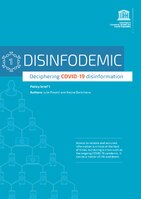
Photo from wikipedia
Purpose Due to the novel and rapidly evolving nature of the COVID-19 pandemic, there has been a widespread perpetuation of myths, rumours, and conspiracy theories about the pandemic. This has… Click to show full abstract
Purpose Due to the novel and rapidly evolving nature of the COVID-19 pandemic, there has been a widespread perpetuation of myths, rumours, and conspiracy theories about the pandemic. This has led to the emergence of an “infodemic” of fake news and distorted facts. Our study examines Nigerians’ knowledge and sources of COVID-19 information during the pandemic. Methods & Materials We conducted a web-based cross-sectional survey of internet users (≥ 16 years old) resident in Nigeria targeted through snowballing sampling. The questionnaire was deployed using the JISC platform (https://www.onlinesurveys.ac.uk/) between 19th May 2020 to 18th June 2020. Descriptive statistics and chi-square (χ2) were reported while multivariable logistic regression was conducted to estimate the association between selected predictor variables and a good COVID-19 knowledge. Results A total of 406 respondents across all six geopolitical zones in Nigeria were recruited for the survey. Varying proportion of the respondents agreed with some of the prevailing misinformation such as the bioengineered weapon origin of COVID-19 (29.6%), and that herbal mixtures (18.7%) and antibiotics (9.1%) are efficacious cures. A lesser proportion also believed the virus was engineered for population control (9.9%) and vaccination enforcement (5.7%), as a plague caused by sins (4.7%) and a consequence of the 5G network technology (2.5%). Most respondents ranked international health organisations (73.9%) and health/public health workers (70.7%) as their most trusted sources of COVID-19 information while a comparatively lower proportion indicated their trust in government statements (40.6%) and social media sources (22.4%). Multivariable regression reveals a number of predictors of COVID-19 knowledge such as being urban settlers (OR:2.98, 95% C.I:1.05 – 8.49, p = 0.04) compared to rural dwellers; resident in the North Central zone (OR:0.53, 95% C.I:0.30 - 0.95, p = 0.03) and the Northwest zone (OR:0.20, 95% C.I:0.07 - 0.60, p = 0.004) compared to those in Southwest zone of Nigeria; and having a non-medical educational/professional background (95% C.I: 0.29 - 0.85, p = 0.01) compared to a medical/science background. Conclusion The findings highlight factors to consider in designing proactive risk communication strategies during a disease outbreak and the importance of a targeted approach for COVID-19 health communication.
Journal Title: International Journal of Infectious Diseases
Year Published: 2022
Link to full text (if available)
Share on Social Media: Sign Up to like & get
recommendations!